5大价值观
- 格式:pdf
- 大小:126.31 KB
- 文档页数:6
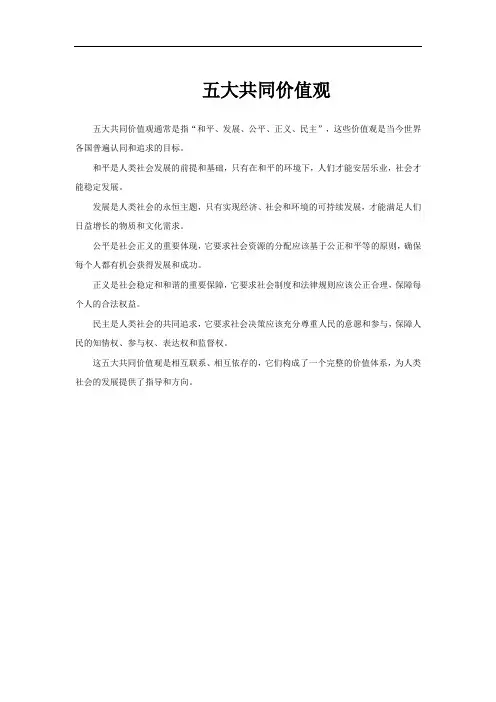
五大共同价值观
五大共同价值观通常是指“和平、发展、公平、正义、民主”,这些价值观是当今世界各国普遍认同和追求的目标。
和平是人类社会发展的前提和基础,只有在和平的环境下,人们才能安居乐业,社会才能稳定发展。
发展是人类社会的永恒主题,只有实现经济、社会和环境的可持续发展,才能满足人们日益增长的物质和文化需求。
公平是社会正义的重要体现,它要求社会资源的分配应该基于公正和平等的原则,确保每个人都有机会获得发展和成功。
正义是社会稳定和和谐的重要保障,它要求社会制度和法律规则应该公正合理,保障每个人的合法权益。
民主是人类社会的共同追求,它要求社会决策应该充分尊重人民的意愿和参与,保障人民的知情权、参与权、表达权和监督权。
这五大共同价值观是相互联系、相互依存的,它们构成了一个完整的价值体系,为人类社会的发展提供了指导和方向。
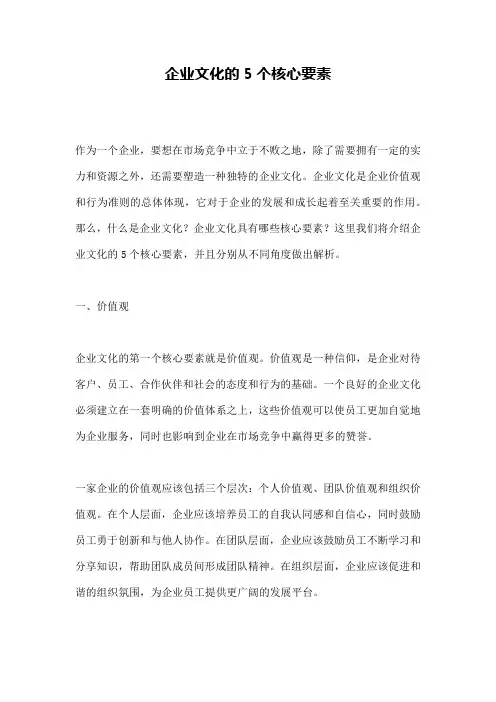
企业文化的5个核心要素作为一个企业,要想在市场竞争中立于不败之地,除了需要拥有一定的实力和资源之外,还需要塑造一种独特的企业文化。
企业文化是企业价值观和行为准则的总体体现,它对于企业的发展和成长起着至关重要的作用。
那么,什么是企业文化?企业文化具有哪些核心要素?这里我们将介绍企业文化的5个核心要素,并且分别从不同角度做出解析。
一、价值观企业文化的第一个核心要素就是价值观。
价值观是一种信仰,是企业对待客户、员工、合作伙伴和社会的态度和行为的基础。
一个良好的企业文化必须建立在一套明确的价值体系之上,这些价值观可以使员工更加自觉地为企业服务,同时也影响到企业在市场竞争中赢得更多的赞誉。
一家企业的价值观应该包括三个层次:个人价值观、团队价值观和组织价值观。
在个人层面,企业应该培养员工的自我认同感和自信心,同时鼓励员工勇于创新和与他人协作。
在团队层面,企业应该鼓励员工不断学习和分享知识,帮助团队成员间形成团队精神。
在组织层面,企业应该促进和谐的组织氛围,为企业员工提供更广阔的发展平台。
二、人才企业文化的第二个核心要素是人才。
人才是企业发展的核心资源,企业必须关注员工的成长和发展,提供培训和发展机会,持续改进员工福利和激励机制。
一个优秀的企业文化可以吸引和留住优秀人才,为企业的卓越表现奠定基础。
企业应该找到适合自己的人才,积极发掘和吸引优秀人才,并为他们提供良好的职业发展路径。
企业应该为员工提供全面的培训和发展机会,支持他们拓展知识面,提高技能水平。
企业还应该以优秀员工为榜样,并为员工提供具有挑战性和发展空间的大型项目和创新机会,激励员工不断进取。
三、管理理念企业文化的第三个核心要素是管理理念。
管理理念是企业在经营过程中的方向和指导思想,决定着企业的发展方向和进程。
一个清晰的管理理念可以提升企业的绩效和竞争力,帮助企业迅速适应变化的市场环境。
企业的管理理念应该围绕核心价值观和人才哲学展开。
在管理方面,企业应该采用灵活的管理模式,鼓励员工创新,促进团队合作和协作,提升各级管理人员的素质。
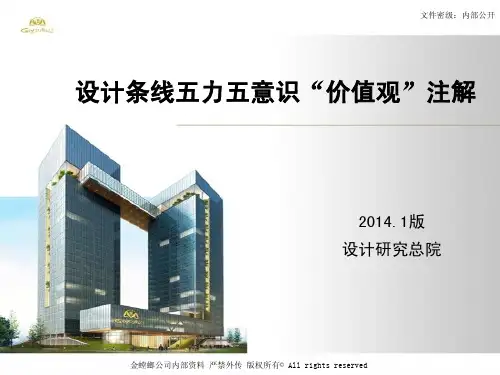
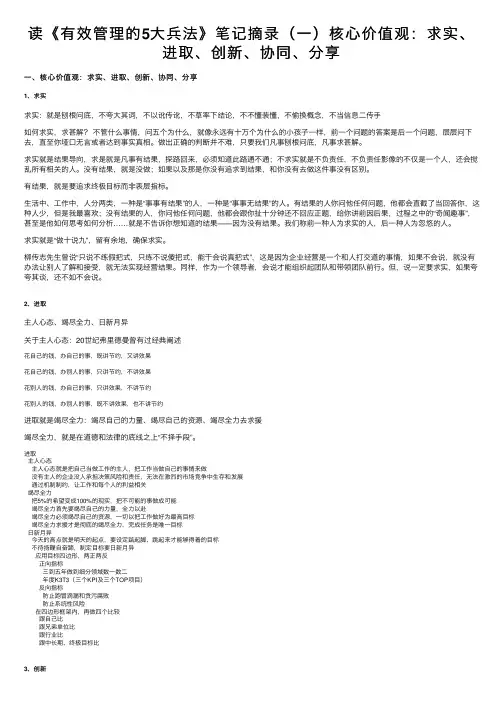
读《有效管理的5⼤兵法》笔记摘录(⼀)核⼼价值观:求实、进取、创新、协同、分享⼀、核⼼价值观:求实、进取、创新、协同、分享1、求实求实:就是刨根问底,不夸⼤其词,不以讹传讹,不草率下结论,不不懂装懂,不偷换概念,不当信息⼆传⼿如何求实,求甚解?不管什么事情,问五个为什么,就像永远有⼗万个为什么的⼩孩⼦⼀样,前⼀个问题的答案是后⼀个问题,层层问下去,直⾄你垭⼝⽆⾔或者达到事实真相。
做出正确的判断并不难,只要我们凡事刨根问底,凡事求甚解。
求实就是结果导向,求是就是凡事有结果,探路回来,必须知道此路通不通;不求实就是不负责任,不负责任影像的不仅是⼀个⼈,还会搅乱所有相关的⼈。
没有结果,就是没做;如果以及那是你没有追求到结果,和你没有去做这件事没有区别。
有结果,就是要追求终极⽬标⽽⾮表层指标。
⽣活中、⼯作中,⼈分两类,⼀种是“事事有结果”的⼈,⼀种是“事事⽆结果”的⼈。
有结果的⼈你问他任何问题,他都会直截了当回答你,这种⼈少,但是我最喜欢;没有结果的⼈,你问他任何问题,他都会跟你扯⼗分钟还不回应正题,给你讲前因后果,过程之中的“奇闻趣事”,甚⾄是他如何思考如何分析……就是不告诉你想知道的结果——因为没有结果。
我们称前⼀种⼈为求实的⼈,后⼀种⼈为忽悠的⼈。
求实就是“做⼗说九”,留有余地,确保求实。
柳传志先⽣曾说“只说不练假把式,只练不说傻把式,能⼲会说真把式”,这是因为企业经营是⼀个和⼈打交道的事情,如果不会说,就没有办法让别⼈了解和接受,就⽆法实现经营结果。
同样,作为⼀个领导者,会说才能组织起团队和带领团队前⾏。
但,说⼀定要求实,如果夸夸其谈,还不如不会说。
2、进取主⼈⼼态、竭尽全⼒、⽇新⽉异关于主⼈⼼态:20世纪弗⾥德曼曾有过经典阐述花⾃⼰的钱,办⾃⼰的事,既讲节约,⼜讲效果花⾃⼰的钱,办别⼈的事,只讲节约,不讲效果花别⼈的钱,办⾃⼰的事,只讲效果,不讲节约花别⼈的钱,办别⼈的事,既不讲效果,也不讲节约进取就是竭尽全⼒:竭尽⾃⼰的⼒量、竭尽⾃⼰的资源、竭尽全⼒去求援竭尽全⼒,就是在道德和法律的底线之上“不择⼿段”。
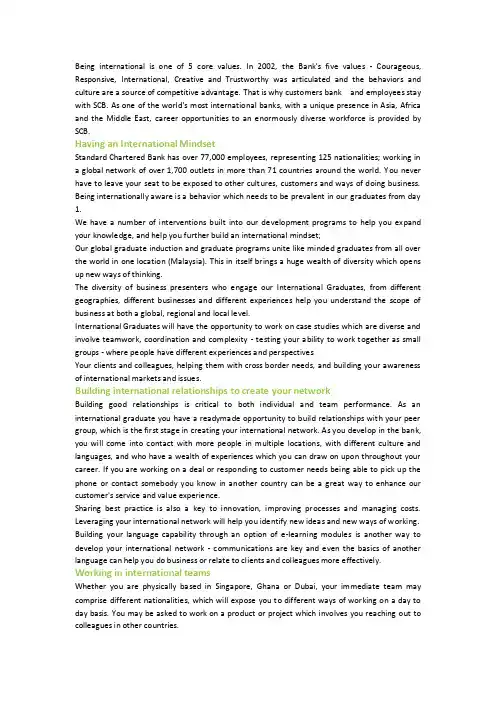
Being international is one of 5 core values. In 2002, the Bank's five values - Courageous, Responsive, International, Creative and Trustworthy was articulated and the behaviors and culture are a source of competitive advantage. That is why customers bank and employees stay with SCB. As one of the world's most international banks, with a unique presence in Asia, Africa and the Middle East, career opportunities to an enormously diverse workforce is provided by SCB.Having an International MindsetStandard Chartered Bank has over 77,000 employees, representing 125 nationalities; working in a global network of over 1,700 outlets in more than 71 countries around the world. You never have to leave your seat to be exposed to other cultures, customers and ways of doing business. Being internationally aware is a behavior which needs to be prevalent in our graduates from day 1.We have a number of interventions built into our development programs to help you expand your knowledge, and help you further build an international mindset;Our global graduate induction and graduate programs unite like minded graduates from all over the world in one location (Malaysia). This in itself brings a huge wealth of diversity which opens up new ways of thinking.The diversity of business presenters who engage our International Graduates, from different geographies, different businesses and different experiences help you understand the scope of business at both a global, regional and local level.International Graduates will have the opportunity to work on case studies which are diverse and involve teamwork, coordination and complexity - testing your ability to work together as small groups - where people have different experiences and perspectivesYour clients and colleagues, helping them with cross border needs, and building your awareness of international markets and issues.Building international relationships to create your networkBuilding good relationships is critical to both individual and team performance. As an international graduate you have a readymade opportunity to build relationships with your peer group, which is the first stage in creating your international network. As you develop in the bank, you will come into contact with more people in multiple locations, with different culture and languages, and who have a wealth of experiences which you can draw on upon throughout your career. If you are working on a deal or responding to customer needs being able to pick up the phone or contact somebody you know in another country can be a great way to enhance our customer's service and value experience.Sharing best practice is also a key to innovation, improving processes and managing costs. Leveraging your international network will help you identify new ideas and new ways of working. Building your language capability through an option of e-learning modules is another way to develop your international network - communications are key and even the basics of another language can help you do business or relate to clients and colleagues more effectively. Working in international teamsWhether you are physically based in Singapore, Ghana or Dubai, your immediate team may comprise different nationalities, which will expose you to different ways of working on a day to day basis. You may be asked to work on a product or project which involves you reaching out to colleagues in other countries.To help you gain some experience of operating in such a team we have developed an Action Learning Program. As an International Graduate you will become part of a small virtual team and have the opportunity to work on a live project, being mentored by senior managers from different locations and different parts of the business. To spice things up there is an element of competition amongst the different graduate teams, with a focus not only on the outcome but on how you operate as a virtual team.International Graduates are Located in High Growth MarketsWe have graduate positions in a number of high growth markets in Asia, Africa and the Middle East. These are some of the most exciting markets in the world, and our strategic focus is to pursue growth opportunities in these markets. Being an international graduate located in a high growth market in an organization that aspires to be the world's best international bank, will be an exciting opportunity that almost by definition is a great start to an internationally focused career.International Career OpportunitiesOur unique footprint enables our International Graduates to build capabilities, gain experience and develop knowledge that other companies cannot necessarily offer. After the initial stages of your career, having developed the right international mindset, a strong network, and a great performance track record, you are likely to get the opportunity to consider other roles internationally, and to be able to broaden your direct international experience.Being trustworthy is important as you work at living a life of abundance. How can you expect to discover abundance in any area of your life if others don't feel they can trust you? Abundance can't be attained all on your own. Eventually, you'll need the help of other people in your quest for a quality and satisfying way of life. When those around you know you're trustworthy, it'll go a long way. I feel trust is something that's rare in today's world. We all know our so-called "leaders" are full of "you know what" and are lying every time they open their mouths. We know many corporations and government agencies have lied to us. Some of these lies have brought them great profits while causing innocent people to come down with serious illnesses. So, imagine what happens when you live an authentic life and come to be known as a person who is genuinely trustworthy. You stand out immensely. You shine in the eyes of others. People want to be around you."Honesty is the first chapter of the book of wisdom."- Thomas JeffersonDoes it take time to build trust? Absolutely. However, when you have that kind of reputation, great things begin to happen. I have a friend, Dave who has a friend called Jack, who he's built a great relationship with. They both trust one another without any questions. I know he's trustworthy beyond belief. This didn't happen overnight. They've known each other over eight years. Over time, he knew his friend, Jack, was a quality person and that just made him want to be around. The more they got to know one another, the more they found out they had many similar interests and could help one another. They've built two websites together and are currently researching real estate projects. These aren't the types of things you want to do with someone you can't trust! They both bring different talents to the table that helps make theirbusiness pursuits successful. Finding an honest partner helps to build abundance into both their lives. I pass this story on to show that you would be able to attract the right people into your life by doing trustworthy. As you attract other trustworthy friends, you'll eventually find one or two that you can work together with. By working together, you can help one another achieve life abundance that much more quickly. Also, it's just enriching to be around other people of quality. They're a breath of fresh air in comparison to all the lying and deception we're exposed to. It helps you have faith in others. It keeps you positive and optimistic.As one of 5 core values, trustworthy links diverse colleagues in SCB together. We smoothly work together because we trust each other.Responsible:As mentioned to responsibility, I think it refers to corporate social responsibility.Over the past few years, a rising emphasis has been placed on companies and financial institutions' Corporate Social Responsibility. But what does Corporate Social Responsibility (CSR)" mean anyway? This is indeed one of the most frequently asked questions for all those dealing with CSR matters.CSR is also known as corporate responsibility, corporate citizenship, responsible business, sustainable responsible business (SRB), or corporate social performance. Different organizations have developed different definitions and there is large common ground between them.A simple definition refers to CSR as how c ompanies and financial institutions take into consideration the impact on society of their operational activities. Consequently, it requires a built-in, self-regulating mechanism whereby businesses would monitor and ensure their adherence to law, ethical standards, and international norms to produce an overall positive impact on society.It is not surprising to see that CSR is subject to considerable amount of debate and criticism. Advocates argue that businesses benefit in many ways by operating with a perception broader and longer than their own immediate, short-term profits. Opponents argue that CSR diverts from the basic economic role of business; others argue that it is nothing more than superficial window-dressing;Largely, the banking industry in the Middle East does not realize the central importance of having a defined CSR policy. Many banks do not fully understand the worth of CSR.There are obvious and real gains on hand for banks which have well-designed and successful CSR strategies. They can promote their profile in the community they serve, enhance local, and cross-border economic performance, and enable community development, at the same time strengthening their profitability.CSR focuses more on how companies and financial institutions can contribute through their core business, in addition to traditional charitable donations.CSR and Project FinanceCSR practices are often implemented in banks' core business, which are credit and investments. Project finance is one of the methods to get capital for investment opportunities.Banks consider how to fairly balance the risk and interests of the various participating parties, including protecting the interest of those who are directly and indirectly affected - specifically the local community that reside within or close to the area impacted by the project.It is recommended that banks recognize their responsibility to prevent or limit social and environmental harm that may have been caused by activities financed by them; they need to adopt appropriate analysis and verification procedures.Banks have impact on the environment directly and indirectly. Lending and investments activities have an indirect impact on the environment. Therefore, banks should be encouraged to consider environmentally-friendly purposes in their credit decisions. To this end, banks may offer incentives to credit facilities for "green" investments such as improving a buildings' insulation or more efficient lighting systems which use alternative energy sources. The bank may apply le ss stringent rules in relation to collaterals or offer discounted loans to such clients for these types of investments.Community involvementCommunity involvement is the basis of all accomplished CSR policy initiatives and extends far beyond the standard charitable measures. Banks should introduce innovative schemes such as:- permanent learning programs for disadvantaged sectors of society;- sponsorship of young entrepreneurs;- provision of academic scholarships and research proposals;- support environmental issues such as recycling and waste management;- community support programs;- health support programs;- financial support for art and culture;Banks may also support non-governmental organizations engaged in drug prevention measures for the youth with a mentorship and parental training programmes. Bank employees can be mentors for pupils at the senior level of the compulsory school during one school year. Awareness and TransparencyIt is essential that there should be a transparent and strong commitment to adoption of CSR practices. This can be reached through explicit reference to CSR activities adopted by banks through the following means:-dedicating sections of Annual Reports to CSR matters;-publishing of Sustainability Reports and/or policy statements on CSR; and web-based information.It should be noted that corporate sustainability for banks is much more than mere charity. In this context, banks are encouraged to improve the future of the people in all communities they operate through CSR programmes, which in turn will sustain their business in the future.In Europe, a dramatic change has been in the type of CSR reporting which has changed from simply environmental reporting to sustainability (social, environmental and economic reporting which has now become typical among top listed companies). There has been an increase in the number of companies publishing CSR information as part of their annual reports.Banks and the EnvironmentJust like other business sectors, the business of banking has a direct impact on the environment through consumption of paper, energy, waste management and means of transport used. Direct environmental impact can be reduced by keeping environmental order in banks themselves, through limiting the consumption of energy and paper, ensuring good waste management and requiring suppliers' to conform to environmental standards. A bank can minimize the impact in a systematic manner through implementing an environmental policy; it can even go further andapply for environmental certification in accordance with ISO 14001.The ISO 14001 is a standard for environmental management systems that is applicable to any business. It aims to reduce the environmental footprint of a business and to decrease the pollution and waste a business produces.Good examples from the banking sector include Deutsche Bank, Barclays Bank and Alpine Bank of Colorado. They have constructed a comprehensive Sustainability Management System in accordance with ISO 14001 and permitted an independent certification agency to monitor their commitment in the field of sustainability by making sure they comply with the requirements of ISO 14001 standard.Financial InclusionThe market in which banks operate today requires new range of products targeting new customer segments including groups who are not yet fully integrated in society, and not dealing with banks such as temporary workers, low-income families, and micro businesses operating in poor areas of the country.This situation represents for banks a challenge in terms of designing suitable products for these distinct segments, and the opportunity to develop a new type of business beneficial to all. Some good examples of responding to the challenge would be microfinance and financial education. Banks are encouraged to promote financial education projects involving different target groups. This is achieved in two ways. Firstly, by concluding agreements with strategic partners which are recognized by the target groups in order to inform them better on financial services and products which they will use in their daily life. Secondly, by developing contacts with the local authorities towards certain target groups. These target groups include primary schools, secondary schools, higher education, universities, and the general public world.Some initiatives involve surveys which provide insight into the challenges and opportunities related to financial literacy in the target groups of children, teens, students and young adults. Another consists of developing new products, educational materials and events intended to stimulate financial skills and knowledge. Perhaps the best example is an educational website with fun, online exercises for children, tips and advice for parents on how to educate children financially.。
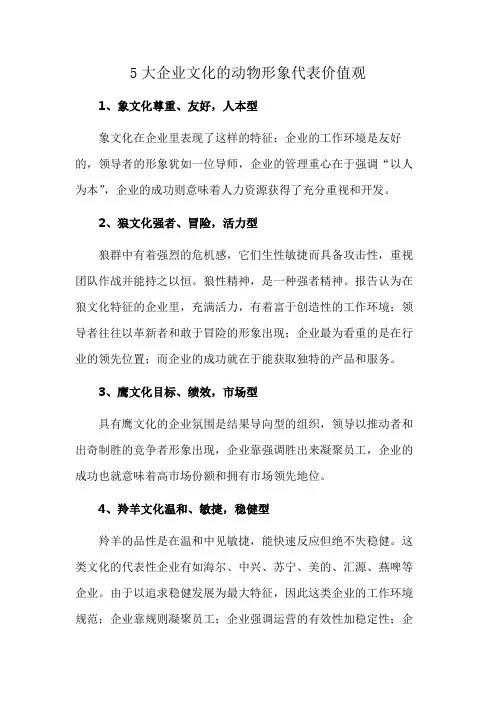
5大企业文化的动物形象代表价值观
1、象文化尊重、友好,人本型
象文化在企业里表现了这样的特征:企业的工作环境是友好的,领导者的形象犹如一位导师,企业的管理重心在于强调“以人为本”,企业的成功则意味着人力资源获得了充分重视和开发。
2、狼文化强者、冒险,活力型
狼群中有着强烈的危机感,它们生性敏捷而具备攻击性,重视团队作战并能持之以恒。
狼性精神,是一种强者精神。
报告认为在狼文化特征的企业里,充满活力,有着富于创造性的工作环境;领导者往往以革新者和敢于冒险的形象出现;企业最为看重的是在行业的领先位置;而企业的成功就在于能获取独特的产品和服务。
3、鹰文化目标、绩效,市场型
具有鹰文化的企业氛围是结果导向型的组织,领导以推动者和出奇制胜的竞争者形象出现,企业靠强调胜出来凝聚员工,企业的成功也就意味着高市场份额和拥有市场领先地位。
4、羚羊文化温和、敏捷,稳健型
羚羊的品性是在温和中见敏捷,能快速反应但绝不失稳健。
这类文化的代表性企业有如海尔、中兴、苏宁、美的、汇源、燕啤等企业。
由于以追求稳健发展为最大特征,因此这类企业的工作环境规范;企业靠规则凝聚员工;企业强调运营的有效性加稳定性;企
业的成功是凭借可靠的服务、良好的运行和低成本。
5、骏马文化快准狠,速度型
马群中具有团结,而且速度快,这对企业有很强的需求欲望。

shein的五个价值观形象概述说明1. 引言1.1 概述在当今的时尚行业中,Shein作为一家知名的电商平台,以其独特而前卫的设计理念和革新性的销售模式迅速崛起。
作为一家年轻的公司,Shein始终坚持着五个核心价值观,在业界树立起了自己的独特形象。
本文将深入探讨Shein的这五个价值观形象,并对其重要性和影响力进行评估。
1.2 文章结构本文主要分为三个部分:引言、Shein的五个价值观形象和结论。
在引言部分,我们将介绍Shein的背景以及文章内容安排;在第二部分,我们将详细描述Shein的五个核心价值观形象;最后,在结论部分,我们将总结这些价值观对于Shein公司的重要性和影响力。
1.3 目的本文旨在通过对Shein的五个核心价值观进行概述和说明,深入了解该公司在市场中树立起来的形象。
通过探究这些价值观,我们可以更好地理解Shein如何实现了规模化生产、高效物流和市场导向等策略,并探讨它们对公司成功的影响。
同时,通过对Shein的重要性和影响力进行衡量,我们可以看到这个年轻电商平台在全球市场中所取得的巨大成就。
本文旨在为读者提供有关Shein的深入了解,并为行业内其他公司提供借鉴和启示。
2. Shein的五个价值观形象:2.1 价值观1:Shein的第一个价值观是时尚敏锐。
作为一家快时尚品牌,Shein非常注重紧跟时尚潮流的变化。
他们不断搜集全球各地的时尚信息,提供最新、最热门的款式和设计,以满足顾客对时尚的需求。
2.2 价值观2:第二个价值观是产品质量保证。
Shein致力于为顾客提供高质量的产品。
他们与可靠的制造商合作,并采用严格的生产和质量控制流程来确保产品质量。
此外,他们还进行了多轮检测,以确保每一件产品都符合顾客期望。
2.3 价值观3:创新精神是Shein的第三个核心价值观。
他们鼓励员工提出新想法和创意,并致力于为顾客带来独特而创新的设计。
Shein通过不断推陈出新,探索新兴市场和引入新技术来展示他们在行业中的领先地位。
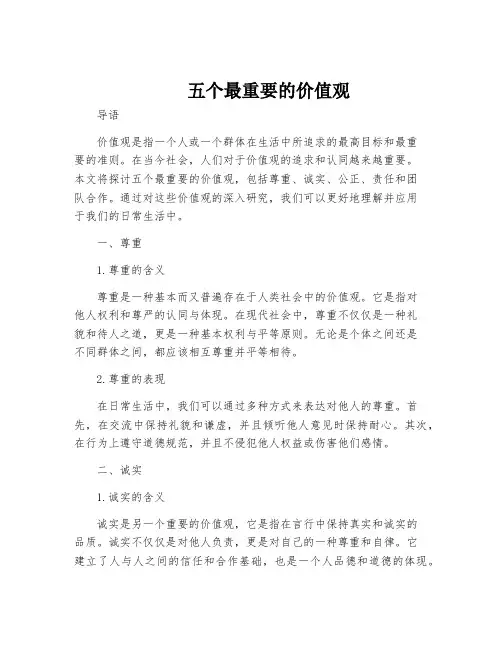
五个最重要的价值观导语价值观是指一个人或一个群体在生活中所追求的最高目标和最重要的准则。
在当今社会,人们对于价值观的追求和认同越来越重要。
本文将探讨五个最重要的价值观,包括尊重、诚实、公正、责任和团队合作。
通过对这些价值观的深入研究,我们可以更好地理解并应用于我们的日常生活中。
一、尊重1.尊重的含义尊重是一种基本而又普遍存在于人类社会中的价值观。
它是指对他人权利和尊严的认同与体现。
在现代社会中,尊重不仅仅是一种礼貌和待人之道,更是一种基本权利与平等原则。
无论是个体之间还是不同群体之间,都应该相互尊重并平等相待。
2.尊重的表现在日常生活中,我们可以通过多种方式来表达对他人的尊重。
首先,在交流中保持礼貌和谦虚,并且倾听他人意见时保持耐心。
其次,在行为上遵守道德规范,并且不侵犯他人权益或伤害他们感情。
二、诚实1.诚实的含义诚实是另一个重要的价值观,它是指在言行中保持真实和诚实的品质。
诚实不仅仅是对他人负责,更是对自己的一种尊重和自律。
它建立了人与人之间的信任和合作基础,也是一个人品德和道德的体现。
2.诚实的实践在现代社会中,我们常常面临各种各样的诱惑和压力,但我们应该始终坚持真实与诚实。
无论是在工作中还是在生活中,我们都应该遵守承诺、避免欺骗他人,并且勇于面对自己的错误。
三、公正1.公正的含义公正是指对待他人时不偏袒、不偏离道义原则,并且按照公平公正的标准行事。
公正不仅仅体现了社会正义与道义准则,更能够建立起一个和谐稳定的社会环境。
2.公正的实践在日常生活中,我们应该始终坚持公正原则,并且避免任何形式的歧视或偏见。
无论是在工作还是生活中,在面对决策时都要保持客观、公平并尽量考虑到各方利益。
四、责任1.责任的含义责任是指对自己和他人的行为和结果承担义务和责任。
它是一种自律和自我约束的体现,也是对他人关怀和尊重的表现。
拥有责任感的人能够更好地完成自己的职责,同时也能够更好地关心他人,并为社会做出贡献。
2.责任的实践在日常生活中,我们应该时刻保持对自己行为结果负责,并且尽力帮助他人。
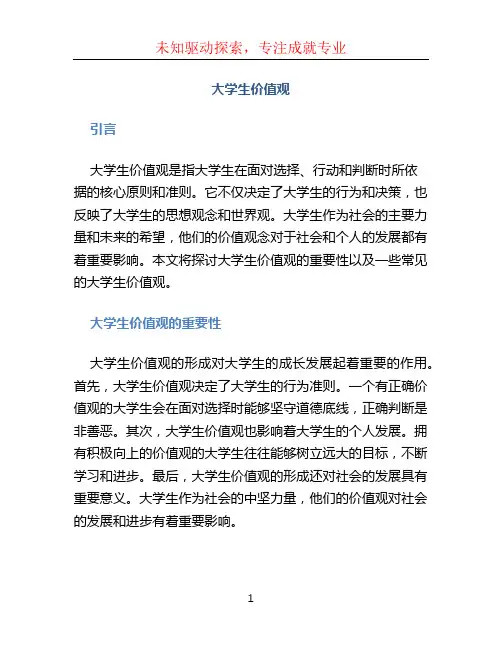
大学生价值观引言大学生价值观是指大学生在面对选择、行动和判断时所依据的核心原则和准则。
它不仅决定了大学生的行为和决策,也反映了大学生的思想观念和世界观。
大学生作为社会的主要力量和未来的希望,他们的价值观念对于社会和个人的发展都有着重要影响。
本文将探讨大学生价值观的重要性以及一些常见的大学生价值观。
大学生价值观的重要性大学生价值观的形成对大学生的成长发展起着重要的作用。
首先,大学生价值观决定了大学生的行为准则。
一个有正确价值观的大学生会在面对选择时能够坚守道德底线,正确判断是非善恶。
其次,大学生价值观也影响着大学生的个人发展。
拥有积极向上的价值观的大学生往往能够树立远大的目标,不断学习和进步。
最后,大学生价值观的形成还对社会的发展具有重要意义。
大学生作为社会的中坚力量,他们的价值观对社会的发展和进步有着重要影响。
常见的大学生价值观团队合作团队合作是大学生重要的价值观之一。
在大学生活中,团队合作不仅可以培养大学生的合作精神和团队意识,还可以提升大学生的沟通能力和协作能力。
团队合作可以帮助大学生更好地完成学业和社会实践,也能够为大学生的未来职业发展打下基础。
自主创新自主创新是大学生的重要价值观之一。
在21世纪的知识经济时代,拥有自主创新意识和能力是大学生的核心竞争力。
大学生应当注重培养创新思维和创新意识,积极参与创新活动,并将创新理念应用到学业和社会实践中。
社会责任社会责任是大学生应该具备的重要价值观之一。
大学生作为社会的一份子,应当关注社会问题和公益活动,积极参与社会实践,为社会发展做出贡献。
社会责任意味着大学生要有意识地尊重他人,关心弱势群体,积极维护社会公平和正义。
个人成长个人成长是大学生的重要价值观之一。
大学生应当注重个人的全面发展,包括知识、技能、品德、身心等各个方面。
大学生应当积极参与各种学习活动和实践项目,不断提升自己的素质和能力,为未来的职业发展和社会角色的承担做好准备。
总结大学生价值观是大学生个人和社会发展的基石,也是大学生在成长过程中不可或缺的一部分。
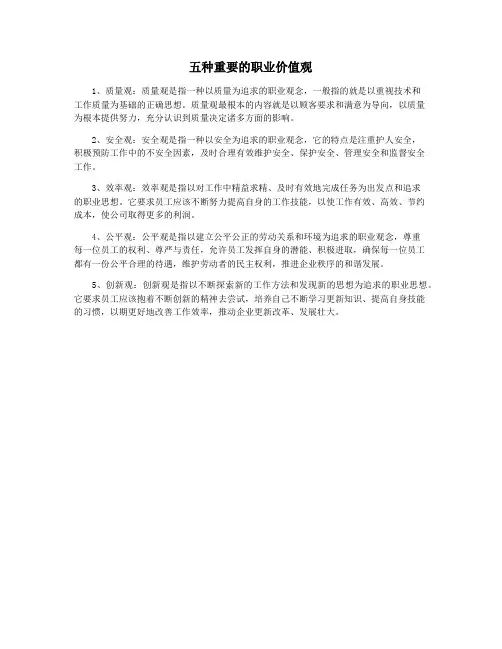
五种重要的职业价值观
1、质量观:质量观是指一种以质量为追求的职业观念,一般指的就是以重视技术和
工作质量为基础的正确思想。
质量观最根本的内容就是以顾客要求和满意为导向,以质量
为根本提供努力,充分认识到质量决定诸多方面的影响。
2、安全观:安全观是指一种以安全为追求的职业观念,它的特点是注重护人安全,
积极预防工作中的不安全因素,及时合理有效维护安全、保护安全、管理安全和监督安全
工作。
3、效率观:效率观是指以对工作中精益求精、及时有效地完成任务为出发点和追求
的职业思想。
它要求员工应该不断努力提高自身的工作技能,以使工作有效、高效、节约
成本,使公司取得更多的利润。
4、公平观:公平观是指以建立公平公正的劳动关系和环境为追求的职业观念,尊重
每一位员工的权利、尊严与责任,允许员工发挥自身的潜能、积极进取,确保每一位员工
都有一份公平合理的待遇,维护劳动者的民主权利,推进企业秩序的和谐发展。
5、创新观:创新观是指以不断探索新的工作方法和发现新的思想为追求的职业思想。
它要求员工应该抱着不断创新的精神去尝试,培养自己不断学习更新知识、提高自身技能
的习惯,以期更好地改善工作效率,推动企业更新改革、发展壮大。
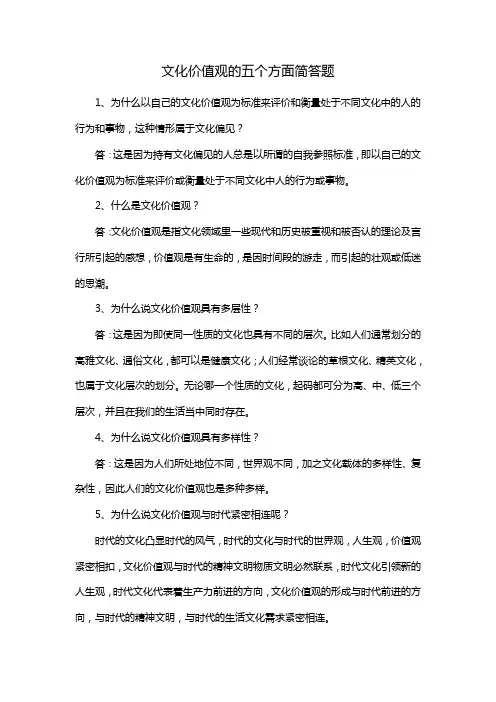
文化价值观的五个方面简答题
1、为什么以自己的文化价值观为标准来评价和衡量处于不同文化中的人的行为和事物,这种情形属于文化偏见?
答:这是因为持有文化偏见的人总是以所谓的自我参照标准,即以自己的文化价值观为标准来评价或衡量处于不同文化中人的行为或事物。
2、什么是文化价值观?
答:文化价值观是指文化领域里一些现代和历史被重视和被否认的理论及言行所引起的感想,价值观是有生命的,是因时间段的游走,而引起的壮观或低迷的思潮。
3、为什么说文化价值观具有多层性?
答:这是因为即使同一性质的文化也具有不同的层次。
比如人们通常划分的高雅文化、通俗文化,都可以是健康文化;人们经常谈论的草根文化、精英文化,也属于文化层次的划分。
无论哪一个性质的文化,起码都可分为高、中、低三个层次,并且在我们的生活当中同时存在。
4、为什么说文化价值观具有多样性?
答:这是因为人们所处地位不同,世界观不同,加之文化载体的多样性、复杂性,因此人们的文化价值观也是多种多样。
5、为什么说文化价值观与时代紧密相连呢?
时代的文化凸显时代的风气,时代的文化与时代的世界观,人生观,价值观紧密相扣,文化价值观与时代的精神文明物质文明必然联系,时代文化引领新的人生观,时代文化代表着生产力前进的方向,文化价值观的形成与时代前进的方向,与时代的精神文明,与时代的生活文化需求紧密相连。
最重要的五项价值观及其含义与规则价值观是指人们对于个体和社会行为的评价准则和追求目标,是人们在道德、道义、人伦关系、生活方式等各个方面的核心价值判断。
以下是最重要的五项价值观及其含义与规则。
1.人道主义价值观:人道主义价值观强调人类的尊严、平等与权利,倡导关怀、关爱和协助他人。
人道主义价值观的规则包括:尊重他人的尊严和权利,关心他人的福祉,树立平等和公正的态度,以及尽力帮助弱势群体。
2.正义价值观:正义价值观强调公平、公正和道义的实现。
人们应当以公平的标准对待他人,平等地分配资源和机会。
正义价值观的规则包括:遵守法律和道德规范,平等对待每个人,确保平等的机会,追求社会公平和道义的实现。
3.自由价值观:自由价值观强调个体的自由和自主权,鼓励独立思考和选择。
人们有权选择自己的信仰、职业、生活方式等。
自由价值观的规则包括:尊重他人的自由权利,追求个体的自由与独立,保护个人隐私和自由表达,以及鼓励创新与个性发展。
4.和谐价值观:和谐价值观强调和平与和谐的相处,包括社会、家庭、人际关系等各个层面。
人们应该以和平与和谐的态度对待他人,不追求利益的冲突和激烈竞争。
和谐价值观的规则包括:崇尚和平、理解和支持他人,解决冲突和矛盾,建立和谐的人际关系和社会环境。
5.责任价值观:责任价值观强调个体对自己及其他人和社会承担的义务和责任。
人们应该对自己的行为负责,同时也应该为社会、环境和未来世代负责。
责任价值观的规则包括:遵守承诺和诺言,关心环境和社会问题,为社会作出积极的贡献,以及关心并支持他人的成长与发展。
最重要的五项价值观是基于对人类尊严、平等和道德的追求,旨在建立一个自由、公平、和谐和责任的社会。
这些价值观的实践需要个体和社会共同努力,通过教育、法律和道德规范的引导,引导人们积极践行这些价值观。
只有当一个社会有了这些价值观的共识和实践,才能实现人类的综合繁荣和社会的进步。
五个最重要的价值观
以下是五个最重要的价值观:
1. 诚实:诚实是一种关键的价值观,它涵盖了诚实、正直和诚信。
诚实是建立信任和真实沟通的基础,它能够帮助我们与他人建立
健康的关系,并树立良好的声誉。
2. 尊重:尊重是对他人的尊严和权利的认可。
尊重别人的意见、观点和感受可以促进和谐的人际关系,增强团队合作,同时也体现了
我们对多样性的包容和接纳。
3. 责任:责任意味着承担自己的行动和决策带来的后果,并在
必要时采取行动去改变或纠正。
有责任感的人会尽力履行自己的义务
和承诺,同时也会对自己的行为承担责任。
4. 公正:公正是指在对待他人时遵循公平和正义的原则。
公正
包括了平等对待每个人、不偏袒和不歧视,建立公正的制度和规则,
以及为每个人提供平等的机会和待遇。
5. 慈善:慈善是指以关爱和帮助他人为核心的价值观。
慈善包
括了善待他人、乐于助人和回馈社会。
慈善不仅可以改善他人的生活,还能够提升我们自己的幸福感和满足感。
社会主义价值观
社会主义价值观是指在社会主义制度下,人们所追求和信奉的一系列价值观念。
这些价值观主要包括以下几个方面:
1. 公平正义:社会主义价值观强调社会的公平和正义,倡导人们共同享有社会资源,追求社会的平等和公正。
2. 社会福利:社会主义价值观重视社会福利,关注弱势群体的权益保障,追求社会的全面发展和人民的幸福生活。
3. 共同利益:社会主义价值观强调人与人之间的团结和合作,倡导人们为共同利益而奋斗,追求全体人民的共同富裕。
4. 集体主义:社会主义价值观强调集体主义精神,强调个人利益服从集体利益,追求集体的荣誉和发展。
5. 公共利益:社会主义价值观注重公共利益,倡导人们为社会公益而奉献,追求国家和社会的长远利益。
6. 自由平等:社会主义价值观主张人们的自由和平等,追求人的全面发展和个体权利的保障。
7. 爱国主义:社会主义价值观强调爱国主义情感,倡导人们热爱自己的国家,为国家的利益而奋斗。
这些社会主义价值观在不同的社会主义国家和时期可能有所不同,
但总体上都强调社会的公平正义、社会福利和集体利益,以及个人的自由平等和国家的利益。
五观、五个认同、社会主义核心价值观教育主题班会教案学习时间: 2019 年 9 月 12 日学习内容:五观、五个认同、社会主义核心价值观教育主题班会学习地点:四年级一班教学目标:1.通过学习,了解马克思主义“五观、五个认同、社会主义核心价值观”的意义。
2.为引导学生培育和践行社会主义核心价值观,加强全校学生的思想道德建设,号召学生争做爱国守法、勤奋好学、明礼诚信、团结友善的人,争做“爱国、敬业、诚信、友善”的好公民,提高学生的思想道德素养。
教学过程:(一)班主任宣布主题班会开始习总书记指出,社会主义核心价值观体现了古圣先贤的思想,体现了仁人志士的夙愿,体现了革命先烈的理想,也寄托着各族人民对美好生活的向往,要在全国人民中培育和弘扬,特别要注重从少年儿童抓起。
总书记强调,少年儿童培育和践行社会主义核心价值观,要适应自身年龄和特点,做到记住要求、心有榜样、从小做起。
今天我们在这里学习社会主义核心价值观内容:富强、民主、文明、和谐;自由、平等、公正、法治;爱国、敬业、诚信、友善。
学校是培养和践行社会主义核心价值观的主阵地,尤其是小学生正处于世界观、人生观形成的重要阶段,通过学习我们将形成长效机制,利用家长、学校、家长委员会等组织,指导家长自觉践行社会主义核心价值观,做孩子的榜样,同时家庭与学校要形成合力,树立一批学生身边的好同学、好教师、好家长,发挥典型人物的示范带动作用。
现在我宣布《社会主义核心价值观伴我茁壮成长》主题班会现在开始,请全体学生起立,奏《少先队队歌》。
(二)主持人就位主持人:党的十八大曾首次以“富强、民主、文明、和谐、自由、平等、公正、法制、爱国、敬业、诚信、友善”这 24 个字来高度概括社会主义核心价值观的组成。
这是我党大力弘扬中国梦的时代契机下是最直接的助推力和精神动力,是与我国的发展紧紧相依的。
主持人:社会主义核心价值观是在以马克思主义为指导思想,以实现中国特色社会主义共同理想为目标,坚持以爱国主义为核心的民族精神和改革创新为核心的时代精神相结合的时代背景下实现的,是社会主义核心价值体系最核心的体现。
价值观简述
价值观是指个人或团体对于什么是重要、有意义和有价值的事物的信念和理念。
它是人们对道德、伦理、信仰、目标和行为准则的评价和判断。
价值观是人们行为和决策的指导原则和基础,可以影响个人的行为、态度和选择。
价值观通常包括以下方面:
1. 道德价值观:涉及对善恶、公正、诚实、尊重、责任等道德原则的看法和认同。
2. 社会价值观:涉及对社会公益、社会公平、公共利益、社会责任等问题的看法和认同。
3. 个人发展价值观:涉及对个人成长、自我实现、追求幸福、实现个人目标等的看法和认同。
4. 宗教价值观:涉及对宗教信仰、灵性追求、道德准则等的看法和认同。
5. 文化价值观:涉及对传统、习俗、文化认同等的看法和认同。
价值观的形成受到个人的经历、环境、教育、文化背景等因素的影响。
不同的个体和不同的社会群体可能有不同的价值观。
价值观可以对个体和社会产生重大影响,影响个人的行为决策、社会的发展方向和和谐共处。
5个最重要的价值观5个最重要的价值观1一、爱与敬重:1、任何时候我都要努力去爱我自己和家人,多表达我对他们的爱,让他们感受我的爱。
2、任何时候我都得对家人、挚友、或生疏人敬重;(每个人的心情背后都有个正面的动机。
)做法:①接受他人。
(承认其实力,敬重其需求和志向、看法、想法。
)②信任他人。
(信任其潜能、激励他变更不满现状,适当引导其思索。
)③真诚待人。
(给其有益的反馈,牢靠精确的信息,恳切与之沟通。
)④决不侵扰其尊严,避开评价他人。
3、每天多播给别人暖暖的感觉(多一点热忱、微笑,激励,问候)时,我就感受了别人对我的暖暖的爱。
二、健康与活力:1、当我觉得自己身心均衡、精神集中、精力充足,我就感受了活力。
2、每天肯定要运动5分钟以上。
(每天至少5分钟的持续改善,周末洗衣服,逛街)3、并根据自己的健康理念生活。
(除非不得已,所做的事都必需有助于身体的健康;我都要尽量做那些能增加我体力、耐力及脑力的工作);三、自信:1、遇到任何事,我总能敏捷地去想方法,很有实力地去做。
2、彻底弄懂一件事后,我感受了由内而外散发的自信。
3、假如我确定让自己有信念做一件事,我信任自己总能做好,总有方法,每个人都是独特的,都有着天生的明星气质。
四、欢乐与感恩:1、乐在工作,乐在学习,乐在生活,乐在一切事物中,并且乐此不疲。
2、欢乐是没缘由的,我欢乐是因为我活着。
不管发生了什么事都都会保持乐观、主动、进取的看法。
3、每天所发生的事,都是最对的事,都是上天赐给我的最好礼物,我心存感恩。
并能从中学习,进步,受启发,因此要好好珍惜它,欢乐对待他,发挥他最大价值。
五、学习与成长:1、只要有时间,我就要学习一些有用的学问,并要随时随地活学活用。
2、任何时候我都要把所知道的用在主动的层面上。
3、只要有机会,我就要尽量熬炼和拓展自己的实力;并且任何时候我都要比从前更成熟。
5个最重要的价值观2人生最重要的价值观1、观赏。
在餐厅服务员款待你的时候,花很短的一个瞬间说一句“感谢”,或者赞同他精彩的工作,这不仅让被鼓舞的人收益,而且也让你的灵魂充溢了赏识。